SWEDISH SOUTH ASIAN STUDIES NETWORK
International conference on ”Peacebuilding in Afghanistan: Local, regional and global perspectives”, in Stockholm 6–7 November 2008
Report by Lars Eklund, SASNET
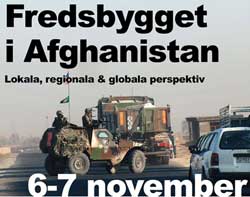
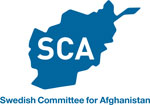 • An International conference on ”Peacebuilding in Afghanistan: Local, regional and global perspectives” was held in Stockholm 6–7 November 2008.
• An International conference on ”Peacebuilding in Afghanistan: Local, regional and global perspectives” was held in Stockholm 6–7 November 2008.
The conference focused on what the peacebuilding efforts look like in the country? What roles do the Afghan authorities, the International Community, the UN and the Nato-led ISAF forces play? Do they contribute to peace or armed conflict? Are there local initiatives at grassroots level promoting peace and how does the civilian population contribute to the reconstruction of the country? Why does Afghanistan receive so little funding for reconstruction compared to other areas of armed conflict? Have the complex developments in Afghanistan become something that the West would rather not have to deal with? What actions are needed in order for Afghanistan to become a country of peace and stability?
The conference was organised by the Swedish Committee for Afghanistan (SCA), in cooperation with ENNA (European Network of NGOs in Afghanistan). Invited speakers included prominent persons such as Sima Samar, Chairperson of the Afghan Independent Human Rights Commission; Kristian Berg Harpviken,
senior researcher at the International Peace Research Institute (PRIO) in Oslo; and the eminent Pakistani writer/journalist Ahmed Rashid. The conference was held at Polstjärnan conference centre, Sveavägen 77 in Stockholm.
First day of the conference
Within the framework of the main conference theme on ”Peacebuilding in Afghanistan – Local, Regional and Global Perspectives”, the conference was divided into a number of sub-sessions, focusing on issues such as Reconciliation and Justice, Institution Building and State Legitimacy, and Security.
The opening session was chaired by Lena Hjelm-Wallén and featured presentations about today’s situation in Afghanistan by Kristian Berg Harpviken, Ahmed Rashid, H.E. Jawed Ludin and Anders Fänge.
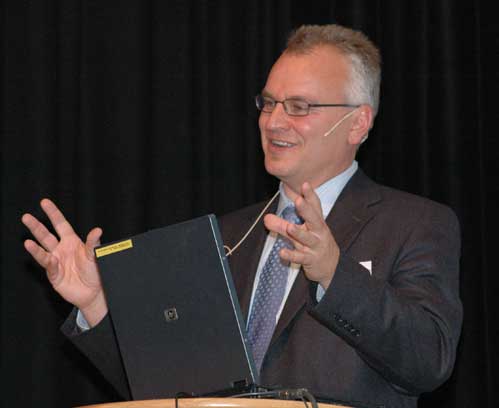 Dr. Kristian Berg Harpviken from the International Peace Research Institute (PRIO) was the first key speaker, introducing the concepts of peace building, in a presentation titled ”Peace Building and its components – the state of the art”. Kristian Harpviken is a sociologist who heads the Working Group on the Transnational and International Facets of Civil War within PRIO’s Centre for the Study of Civil War (CSCW).
Dr. Kristian Berg Harpviken from the International Peace Research Institute (PRIO) was the first key speaker, introducing the concepts of peace building, in a presentation titled ”Peace Building and its components – the state of the art”. Kristian Harpviken is a sociologist who heads the Working Group on the Transnational and International Facets of Civil War within PRIO’s Centre for the Study of Civil War (CSCW).
He discussed three types of conflict solution scenarios that have been used in different world conflicts in recent years; • the compromise solution which has appeared for example in Central America and South Africa, • the new state solution that we have witnessed in East Timor and Kosovs, and the • rundown into a failed state with Somalia as the prime example. Dr. Harpviken declared that the status of Afghanistan today unfortunately is closest to the one of a failed state. There are several of reasons for this failure. First, that the defeated party in the conflict, the Taliban, has not been part of the conflict solution negotiations. Secondly, the fact that the neighbouring states with their varying interests have only been partially involved. And finally the dominant role of external factors, read the US military troops, threatens the legitimacy of any agreements made both internally and externally.
He also discussed how to evolve the peace process in Afghanistan through political means, by development and security, but also the problems involved. He stressed that no strong state can exist without a working relation with society. If too much focus is given on creating a strong centralised state, in reality it will foster a weak state lacking proper roots in the local society. There is also a conflict between the demand for justice, that war criminals should be tried, and the need for national stability.
Complex relation between development and security
Dr. Harpviken then talked about the complex relation between development assistance and security. It has been common to use use and streamline development to create security. But it is problematic to do so in a short time. Besides, since the 1990s the focus on non-violent means to create security has moved into the background. Today the focus is almost entirely on armed violent action. But robust military action creates a fundamental dilemma, since it creates no identification with the local population.
Finally, he referred to a new book by the legendary Norwegian anthropologist Fredrik Barth, who did field research among the Pashtuns in the 1950s and has written several scholarly books on the region, such as ”Political Leadership among Swat Pathans” (1965), ”Ethnic Groups and Boundaries: The Social Organization (1969), ”Cultural Wellsprings of Resistance in Afghanistan” (1987), and ”The Last Wali of Swat – Asian Portraits” (2006).
The new book, published in October 2008, is titled ”Taleban and the Pashtuns”, and his conclusions are according to Kristian Berg Harpviken, most relevant if a peaceful solution should be possible to achieve in today’s Afghanistan.
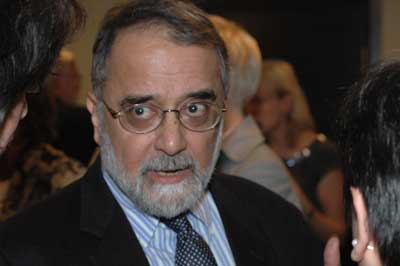 Ahmed Rashid came next. His latest book ”Descent into chaos: US Policy and the Failure of Nation Building in Afghanistan” was published in June 2008, and just in time for the Stockholm conference it had also been translated into Swedish. He presented an overview of the last six years political development in Afghanistan and the region. The picture was grim, reminiscent of the late period of Soviet occupation, but with the difference that it is now the US that would like to withdraw from Afghanistan but can not do so, and the Taliban holds large parts of the countryside but lacks the capacity to take the cities. It means a deadlock in escalation of violence. The whole process of statebuilding is grinding to a halt.
Ahmed Rashid came next. His latest book ”Descent into chaos: US Policy and the Failure of Nation Building in Afghanistan” was published in June 2008, and just in time for the Stockholm conference it had also been translated into Swedish. He presented an overview of the last six years political development in Afghanistan and the region. The picture was grim, reminiscent of the late period of Soviet occupation, but with the difference that it is now the US that would like to withdraw from Afghanistan but can not do so, and the Taliban holds large parts of the countryside but lacks the capacity to take the cities. It means a deadlock in escalation of violence. The whole process of statebuilding is grinding to a halt.
The situation is complicated also because the Taliban has become a regional phenomenon, it has become a model for the whole region. New tactics and methodologies have been introduced in their warfare because of the the al-Qaeda presence. The fact that the Taliban got a safe haven in Pakistan after 2001 plays a large role that led to the growth also of a Pakistani Taliban movement. It is now absolutely necessary to link the development in Pakistan and Afghanistan.
Ahmed Rashid then outlined the reasons why the positive political development in Afghanistan in 2002 has deteriorated into chaos. His key answer to what went wrong is Iraq. When the US invaded Iraq the resources for developing Afghanistan diminished. It meant that no investements were given to build up the infrastructure – not a single power station has for example been constructed in the country during the past 6 years. It also meant that power was given back to the war lords, and the central government did not get sufficient support, and on top of all this there was a clear lack of enough soldiers to fight the war against the Taliban.
Great expectations on Obama government
He finished with a hope that the new American administration under President Obama will have a better understanding of Afghanistan and Pakistan than the previous Bush government, that efforts will be taken to reach out for multiprone solutions to the conflict and more collaboration with the European nations. Ahmed Rashid stresses the need of a regional polict, to get the neighbouring countries involved in the peace efforts, to open up the Pakistan-India dialogue, the Pakistan-Afghan dialogue and the US-Iran dialogue. And most important of all, prepare to talk to the adversary in the conflict, the Taliban.
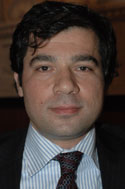 In a presentation titled ”The Government’s peace building attempts 2001–2008”, H.E. Jawed Ludin, Afghanistan’s Ambassador to the Nordic countries (based in Oslo) discussed the mistakes that have been committed since the Bonn conference in 2001. Mr. Ludin earned a MSc in Political Theory from the University of London, and in 2001 he worked with the United Nations in organising the Bonn Conference that laid out the democratic framework for a post-Taliban Afghanistan. He has also published articles and commentaries on conflict and development issues. In 2002, he co-authored the book ”Working with conflicts: Staregies and Skills for Action”.
In a presentation titled ”The Government’s peace building attempts 2001–2008”, H.E. Jawed Ludin, Afghanistan’s Ambassador to the Nordic countries (based in Oslo) discussed the mistakes that have been committed since the Bonn conference in 2001. Mr. Ludin earned a MSc in Political Theory from the University of London, and in 2001 he worked with the United Nations in organising the Bonn Conference that laid out the democratic framework for a post-Taliban Afghanistan. He has also published articles and commentaries on conflict and development issues. In 2002, he co-authored the book ”Working with conflicts: Staregies and Skills for Action”.
Mr. Ludin now criticised the fact that the Bonn conference did not become a true peace conference, and the reason for this was that the defeated party, the Taliban, was not invited. A fact based on a misunderstanding that the Taliban had been eliminated from the political scene once and for all by the military defeat.
In order to secure reconciliation in the country, it is according to Jawed Ludin necessary to involve moderate elements among the Taliban, and draw them back from Pakistan. He applauded a recent Saudi initiative to open up a new dialogue between Afghanistan and Pakistan, but on the other hand he stated that this should not be seen as an exit strategy but as complimentary means to continued military operations. In spite of the hurdles, Mr. Ludin ended his speech in an optimistic mode, saying that the elections set for September 2009 could well mean a real chance for peace in Afghanistan.
Worsening situation
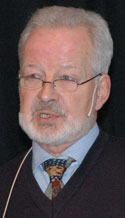 Mr. Anders Fänge was the final speaker in the opening session. Fänge has worked with Afghanistan since the beginning og the 1980s and is currently Country Director of the Swedish Committee. He gave a presentation titled ”The state, conflict and international assistance”, a rather depressing story of how the narrow startegy of the US has undermined the nation-building in Afghanistan and how the international development assistance has not made any major impact in fields such as agriculture, the judiciary, local governance and higher education.
Mr. Anders Fänge was the final speaker in the opening session. Fänge has worked with Afghanistan since the beginning og the 1980s and is currently Country Director of the Swedish Committee. He gave a presentation titled ”The state, conflict and international assistance”, a rather depressing story of how the narrow startegy of the US has undermined the nation-building in Afghanistan and how the international development assistance has not made any major impact in fields such as agriculture, the judiciary, local governance and higher education.
The situation in the country is worsening. There is a lack of confidence in the government and its institutions. Most afghans today prefer traditional courts to the state judiciary. Food prices are increasing and the drought in the north has led to food insecurity. The armed conflict gets more and more violent. August 2008 saw the highest number of civilian casualties in the country since 2001. The Taliban strenghtens its positions, not the least because of its safe havens in the Pakistani Federally Administered Tribal Areas (FATAS) and advances rapidly, even though it is not yet a coherent movement. Peace talks are very unlikely under these conditions, and it is not surprising that most Afghans show a pragmatic view towards the Taliban. It is a rational behaviour because they know that the Taliban may take over the country again anytime.
The opening session was concluded with a panel discussion between Ahmed Rashid, Jawed Ludin and Anders Fänge. The Swedish journalist Agneta Ramberg was the moderator.
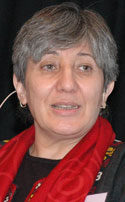 |
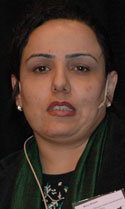 |
| Sima Samar and Mary Akrami. | |
The afternoon session of the conference was devoted to the theme ”Reconciliation and Justice”, and had two keynote speakers, Dr. Sima Samar and Ms. Mary Akrami.
Sima Samar is the chairwoman of the Afghanistan Independent Human Rights Commission, and for some time after 2001 she served as the Deputy Chair and Minister of Women’s Affairs for the Interim Administration. She also established the first-ever Afghanistan Ministry of Women’s Affairs.
Mary Akrami has been the Director of Afghan Women Skills Development Center (AWSDC) since 1999. In 2001, she represented Afghan Civil Society at the peace conference in Bonn. AWSDC is much involved in building shelters for battered women in Afghanistan, and setting up micro-credit enterprise schemes for women.
Dr. Samar held a presentation titled ”The need for justice in peace building” where she desribed the grim human rights situation in Afghanistan today. Human rights violations are common, and she refused to accept the argument that the Taliban has to be involved in negotiations. They are already inside the establishment, having 23 representatives fighting for their cause in the parliament, and 13-14 governors sympathetic to the Taliban or Gulbuddin Hekmatyar. New morality laws are being decided upon, similiar to the ones that were used during the Taliban rule, and more and more restrictions are enforced against women.
Mary Akrami was equally sharp in her observations on the current situation for women in her presentation titled ”How to bury the hatchet – efforts to reconcile”. She disappointedly noted that the role of women in peace building had not been an issue at all in any of the presentations that had been given during the opening session of the conference.
The session on Reconciliation and Justice was concluded with a panel debate that was moderated by the Swedish journalist Nina Hjelmgren.
Second day of the conference
The second day’s proceedings was devoted to the concepts of Institution Building; State Legitimacy; and Security.
In a session titled ”Moving Forward – Peace Building Approaches: Institution Building and State Legitimacy”, three speakers gave presentations, namely H.E. Jelani Popal, General Director and founding director of the Independent Directorate of Local Governance (and previously being deputy Minister of Finance); Dr. Shahrbanou Tadjbakhsh, Director of the Program for Peace and Human Security (formerly Center for Peace and Human Security) at CERI (Centre d’etudes et Recherches Internationales), in Paris); and Mirwais Wardak, Programme Director of Cooperation for Peace and Unity (CPAU).
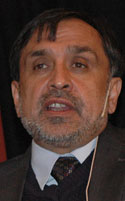 Mr. Jelani Popal’s (photo to the left) presentation was titled ”Government strategies for national and sub-national institution building”. It was a description of the efforts that the Afghani government are implementing in these respects. Mr. Popla said that the state building process today remains at a crucial junction, dependent on Governance policies by the government and by decrees from the president.
Mr. Jelani Popal’s (photo to the left) presentation was titled ”Government strategies for national and sub-national institution building”. It was a description of the efforts that the Afghani government are implementing in these respects. Mr. Popla said that the state building process today remains at a crucial junction, dependent on Governance policies by the government and by decrees from the president.
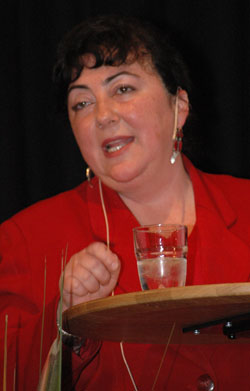 Dr. Shahrbanou Tadjbakhsh (photo to the right), who is of Iranian origin but an American citizen and a resident of France, holds a PhD and a Master's Degree from Columbia University and a Bachelor's Degree from Georgetown University in the US. Before joining CERI in Paris, she worked as an Adjunct Lecturer at Columbia University’s School of International and Public Affairs in the US and also for a period been a visiting professor at Jawaharlal Nehru University (JNU) in New Delhi. Between1995-2002, she worked as a staff member of the UNDP in various field assignments in Central Asia, the CIS and Eastern Europe with a last posting as Policy Advisor to National Human Development Reports (NHDR) at the human Development Report Office in UNDP New York.
Dr. Shahrbanou Tadjbakhsh (photo to the right), who is of Iranian origin but an American citizen and a resident of France, holds a PhD and a Master's Degree from Columbia University and a Bachelor's Degree from Georgetown University in the US. Before joining CERI in Paris, she worked as an Adjunct Lecturer at Columbia University’s School of International and Public Affairs in the US and also for a period been a visiting professor at Jawaharlal Nehru University (JNU) in New Delhi. Between1995-2002, she worked as a staff member of the UNDP in various field assignments in Central Asia, the CIS and Eastern Europe with a last posting as Policy Advisor to National Human Development Reports (NHDR) at the human Development Report Office in UNDP New York.
Dr. Tadjbakhsh gave a fascinating presentation titled ”Liberal peace building and the challenges to enhance state legitimacy”, based on a collaborative research project between the CERI Program for Peace and Human Security (CPHS) and the Faculty of Law and Political Sciences at the University of Kabul. The project was titled ”Models of Peace and Perception Gaps” and lasted from September 2007 till July 2008. More information about the research project (as a pdf-file).
The project was born out of a Memorandum of Understanding (MoU) that was drawn up in September 2007 between the Director of
l'Institut d'Etudes Politiques de Paris (Sciences Po) on behalf of the CERI Program for
Peace and Human Security (CPHS), and Mr. Ashraf, Chancellor of Kabul University on
behalf of the Faculty of Law and Political Sciences. The MoU focuses on a partnership
and exchange of experiences on research and pedagogy on peace studies between. First, links were established between students, professors and researchers of Sciences Po and those of the University of Kabul. Four students and a
professor/researcher (Tadjbakhsh) from CERI regularly came to teach and
conduct joint research with the Department of Law and Political Sciences in Kabul. At the same time, five
Afghan students, two junior professors and a senior professor worked on the
project. The cooperation was aimed at exchanging methods of
research and pedagogy on international relations, with a particular focus on peace studies.
A second objective of the project was to conduct a joint research to examine the gaps in
perceptions between Afghans and the international community on models of peace and
modalities of peacebuilding in Afghanistan.
The study revolved around three research
questions:
– Concepts and Models: Are there gaps in the perceptions of what
constitutes as “peace” between external actors and domestic actors based on
differences in values, in experiences, and expectations? If so, why is there a gap?
Is the model of “liberal peace ” being implemented in Afghanistan and is there
consensus on its legitimacy?
– Perceptions:Is there consensus on the model of liberal peace among
international actors and local partners? Is this model seen as legitimate and
efficient from the point of view of the population?
– Strategies: How is liberal peace being implemented in Afghanistan and is
there consensus, coherence and coordination between the strategies of the
international actors with those of national institutions?
Interesting results from the research
Dr. Tadjbaksh now presented the results from the joint Afghan-French research project, and her conclusions were extremely interesting since this is the first time that a study of this kind has been carried out by Afghani students. They have interviewed a large number of people in power positions in Afghanistan at different levels from governors and down, to investigate their attitudes towards liberal peace building (the prevailing model in the world since 1989).
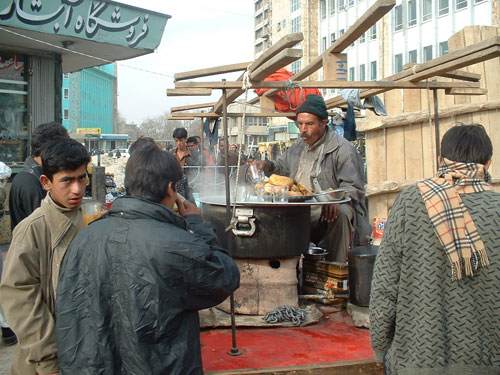 First, it turned out that many Afghans did not understand the concept at all. ”There is no peace in Afghanistan” was a common reaction, so ”why talk about liberal peace? It is a fantasy.” Then the dichotomy between the liberal model with tradition and religious values was highlighted, and the inherent tension between collectivism and individualsm in Afghani society. Many respondents told the interviewers that Islam offers a much better solution. With democracy as an imbibed value in Islam, liberal peace may well go fine with religion. But there are reservations, certain limitations have to be kept.
First, it turned out that many Afghans did not understand the concept at all. ”There is no peace in Afghanistan” was a common reaction, so ”why talk about liberal peace? It is a fantasy.” Then the dichotomy between the liberal model with tradition and religious values was highlighted, and the inherent tension between collectivism and individualsm in Afghani society. Many respondents told the interviewers that Islam offers a much better solution. With democracy as an imbibed value in Islam, liberal peace may well go fine with religion. But there are reservations, certain limitations have to be kept.
A final important observation that the research project pointed at is the fact that the people of Afghanistan still have large expectations from the state. In spite of all the efforts by the international community to impose a liberal economy based on private entrepreneurship on the country, and once and for all do away with the state control that became discredited after the years with a communist Soviet-backed government in the 1980s, most Afghanis have a much more favourable view towards state control. The problems with speculation, monopoly and black labour are all seen as evidence that a free market economy is detrimental. It makes people becoming poor, and is therefore also against Islam that preaches that you show pity on your fellow humans.
In the end, the Afghan people cares less for ideology than for getting food. A mixed economy where the state keeps playing an important role is seen as the ideal.
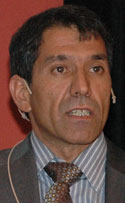 After Dr. Tadjbaksh came Mr. Mirwais Wardak (photo to the right) who gave a presentation titled ”Regaining people’s confidence – strategies to enhance state legitimacy and civil society”, about peace building processes on a field level. Mr. Wardak pointed out that security has to be provided, but corruption hampers the credibility of the government. It has lost much control of the countryside, where contractors now in many cases pay money to the Taliban in order to secure contracts in specific areas.
After Dr. Tadjbaksh came Mr. Mirwais Wardak (photo to the right) who gave a presentation titled ”Regaining people’s confidence – strategies to enhance state legitimacy and civil society”, about peace building processes on a field level. Mr. Wardak pointed out that security has to be provided, but corruption hampers the credibility of the government. It has lost much control of the countryside, where contractors now in many cases pay money to the Taliban in order to secure contracts in specific areas.
Afternoon session on Security
The final session dealing entirely with security consisted of speeches by three people. Ms. Farishta Sakhi, Executive Director of Women’s Activities and Social Services Association (WASSA), working in Herat province; Ms. Carlotta Gall, British reporter with the New York Times in Pakistan and Afghanistan; and Ms. Barbara Stapleton, Deputy to the EU Special Representative in Afghanistan. The session was chaired by Anders Fänge.
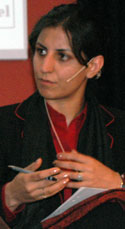 Farishta Sakhi (photo to the right) gave a presentation titled ”What is needed to enhance national security?” which was characterised by strong personal impressions from working with WASSA in Herat. She blamed the international community for paying too little concern about women’s issues such as maternal health, education and basic human rights. In her eyes, there should be hope for the country and no future for the Taliban if women really were involved in the development. Because how would ever the women of Afghanistan forget all sufferings they had to endure during the Taliban years, and legitimise those people that have blood or their hands. But on the other hand, if the external support is missing why should women risk their lives in the prospect that the Taliban might well return to power. Still Farishta Sakhi ended by saying that she still is hopeful that the 2009 elections will make a change, and that terrorism can be effectively tackled with. The policy of giving impunity to the former warlords must however be stopped.
Farishta Sakhi (photo to the right) gave a presentation titled ”What is needed to enhance national security?” which was characterised by strong personal impressions from working with WASSA in Herat. She blamed the international community for paying too little concern about women’s issues such as maternal health, education and basic human rights. In her eyes, there should be hope for the country and no future for the Taliban if women really were involved in the development. Because how would ever the women of Afghanistan forget all sufferings they had to endure during the Taliban years, and legitimise those people that have blood or their hands. But on the other hand, if the external support is missing why should women risk their lives in the prospect that the Taliban might well return to power. Still Farishta Sakhi ended by saying that she still is hopeful that the 2009 elections will make a change, and that terrorism can be effectively tackled with. The policy of giving impunity to the former warlords must however be stopped.
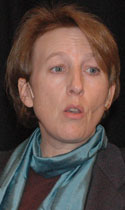 Carlotta Gall (photo to the left) gave a different perspective from a journalistic angle. She has reported from Kabul since 2001 and reaffirmed in her presentation titled ”Strategies for enhancing regional security” previous speakers that the situation is now really depressing. The government has collapsed and the US military actions have been full of so many mistakes, the bombings of innocent people in wedding processions, and the indiscriminate sending of prisoners to Guantanamo among them. Among the few positive things to report about, she mentioned however that the Afghani Intelligence Service is doing a good work on the ground. The rate of suicide bombings has in fact gone down recently.
Carlotta Gall (photo to the left) gave a different perspective from a journalistic angle. She has reported from Kabul since 2001 and reaffirmed in her presentation titled ”Strategies for enhancing regional security” previous speakers that the situation is now really depressing. The government has collapsed and the US military actions have been full of so many mistakes, the bombings of innocent people in wedding processions, and the indiscriminate sending of prisoners to Guantanamo among them. Among the few positive things to report about, she mentioned however that the Afghani Intelligence Service is doing a good work on the ground. The rate of suicide bombings has in fact gone down recently.
Barbara Stapleton ended up with a presentation titled ”Disarming the militias – DDF and DIAG and their impact on peace-building”, giving information about the great problems that have involved in disarming the militias and integrating them into the Afghan army. Ms. Stapleton has studied Middle Eastern history and politics at the School of Oriental and African Strudies (SOAS), Universirty of London, and completed her LLM in inte International law of human rights at the University of Essex in 1991. From 2002 till 2006, she worked with the Agency Coordinating Body For Afghan Relief (ACBAR), the main NGO coordination body based in Kabul, as Advocacy and Policy Coordinator.
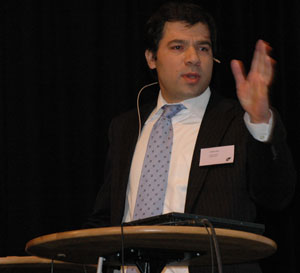 In May 2006 she joined the office of the EU Special Representative in Afghanistan.
In May 2006 she joined the office of the EU Special Representative in Afghanistan.
Looking Ahead
The conference ended up by giving opportunity for two optimistic final speeches on peace building in Afghanistan. Ms. Gunilla Carlsson, Swedish Minister for Development Cooperation had been invited to speak about ”Sweden’s contribution to peace building in Afghanistan”, where she actually broke the news that Sweden will increase its commitment both military and humanitarian to Afghanistan (more information).
Then came H.E. Jawed Ludin (photo to the right) back on stage and gave a presentation titled ”The window of opportunity for peace building initiatives in Afghanistan” where he aired optimism before the elections that will be held in 2009. Let us hope his optimism is well-founded.
Lars Eklund, SASNET
SASNET - Swedish South Asian Studies Network/Lund
University
Address: Scheelevägen 15 D, SE-223 63 Lund, Sweden
Phone: +46 46 222 73 40
Webmaster: Lars Eklund
Last updated
2008-12-09
